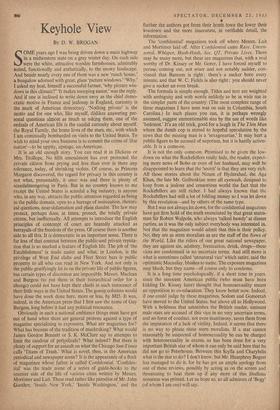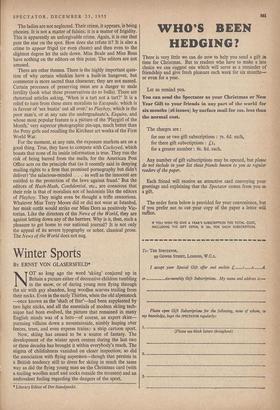Keyhole View
BY D. W. BROGAN SOME years ago I was being driven down a main highway in a midwestern state on a grey winter day. On each side were the white, attractive wooden farmhouses, admirably suited, functionally and esthetically, to the snowy landscape. And beside nearly every one of them was a new 'ranch house,' a bungalow adorned with great, glass 'picture windows."Why,' I asked my host, himself a successful farmer, 'why picture win- dows in this climate?"It makes snooping easier,' was the reply. And if one is inclined to write down envy as the chief demo- cratic motive in France and jealousy in England, curiosity is the mark of American democracy. 'Nothing private' is the motto and for one who, like myself, dislikes answering per- sonal questions almost as much as asking them, one of the ordeals of American life is the candid curiosity about myself. the Royal Family, the home lives of the stars, etc., with which I am continually bombarded on visits to the United States. To wish to mind your own business is to commit the crime of 'lese nation'—to be uppity, upstage, un-American.
It is an old enough story. You can read it in Dickens or Mrs. Trollope. No fifth amendment has ever protected , the private citizen from prying and less than ever is there any tolerance, today, of shrinking violets. Of course, as Princess Margaret discovered, the regard for privacy in this country is not what, presumably, it once was and there is plenty of scandalmongering in Paris. But in no country known to me except the United States is scandal a big industry, is anyone who, in any way, attracts. the public attention regarded as being in the public domain, open to a barrage of insinuation, rhetori- cal questions, near-defamation and plain slander. The law may protect, perhaps does, at times, protect, the totally private citizen, but ineffectually. All attempts to introduce the English principles of contempt of court are heatedly attacked as betrayals of the freedom of the press. Of course there is another side to all this. It is democratic in an important sense. There is far less of that contrast between the public■and private reputa-, tion that is so marked a feature of English life. The job of 'the Establishment' is made easier and what, in London, is the privilege of West End clubs and Fleet Street bars is public property to all who can read in New York. And not only is the public gratifyingly let in on the private life of public figures, but certain types of discretion are impossible. Messrs. Maclean and Burgess (to put them in their hierarchical order for a change) could not have kept their chiefs in such innocence of their little ways in the United States. The gossip columns would have done the work done here, more or less, by MI5. It was, indeed, in the American press that I first saw the name of Guy Burgess, long before it had any political resonance.
Obviously in such a national ambiance things must have got out of hand when there are general protests against a type of magazine specialising in exposures. What are magazines for? What has become of the tradition of muckraking? What would James Gordon Bennett or S. K. McClure say to attempts to limit the candour of periodicals? What indeed? But there is plenty of support for an assault on what the Chicago Sun-Times calls 'Titans of Trash.' What is novel, then, in the American periodical and newspaper scene? It is the appearande of a flock of magazines whose father is called Confidential. 'Confiden- tial' was the trade name of a series of guide-books to the seamier side of the life of various cities written by Messrs. Mortimer and Lait. These read rather like parodies of Mr. John Gunther, 'Inside New York,' Inside Washington,' and the further the authors got from their hofte town the lower their lowdown and the more inaccurate, in verifiable detail, the information.
The 'confidential' magazines took off where Messrs. Lait and Mortimer laid oft. After Confidential came Rave, Uncen- sored, Whisper, Hush-Hush, See, QT, Private Lives. There may be many more, but these are magazines that, with a zeal worthy of Dr. Kinsey or Mr. Gorer,. I have forced myself to peruse, coming out, not wiser and not notably sadder, con- vinced that Barnum is right : there's a sucker born every minute, and that W. C. Fields is also right : you should never give a sucker an even break.
The formula is simple enough._Titles and text are weighted with ambiguity and with words unlikely to be in wide use in the simpler parts of the country'. (The most complete range of these magazines I have seen was on sale in Columbia, South Carolina.) In such places you can, it is perhaps wrongly assumed, suggest unmentionable sins by the use of words like `hedonist.' It's an old trick, good for a laugh in The Thin Man where the dumb cop is stirred to hopeful speculation by the news that the missing man is a 'sexagenarian.' It may hurt a public figure to be accused of nepotism, but it is hardly action- able. It is a come-on.
It is not the only come-on. Promised to be given the low- down on what the Rockefellers really hide, the reader, expect- ing more news of Bobo or even of her husband, may well be disappointed to learn that the 'secret' is that they are very rich. All those stories about the Nizam of Hyderabad, the Aga Khan, the late Mr. Gulbenkian were all eyewash, designed to keep from a jealous and censorious world the fact that the Rockefellers are still richer. I had always known that the Rockefellers had still a lot of folding money so I was let down by this revelation—and by others of the same type.
But I was not always let down, for the confidential magazines have got firm hold of the, truth enunciated by that great states- man Sir Robert Walpole, who,always 'talked bawdy' at dinner parties, as it was the only subject everybody was interested in. Not that the magazines would admit that this- is their policy. No; they are as stern moralists as are the staff of the News of the World. Like the rulers of our great national newspaper, they are against sin, adultery, fornication, drink, drugs—these vices are condemned in no uncertain terms. And still more is what is sometimes called 'unnatural vice' which satire, said the optimistic Macaulay, blushes to name. The exposure magazines may blush, but they name—of course only to condemn.
It is a long time psychologically, if a short time in years. since the innocent American public (who must have been kidding Dr. Kinsey later) thought that homosexuality meant an opposition to co-education. They know better now. Indeed, if one could judge by these magazines, Sodom and Gomorrah have moved to the United States, but above all to Hollywood. With a boldness that astonishes the British reader, eminent male stars are accused of this vice in no very uncertain terms, and no form of conduct, not even matrimony, saves them from the imputation of a lack of virility. Indeed, it seems that there is no way to please these stern moralists. If a star cannot reasonably be suspected of homosexuality he can be charged with heterosexuality in excess, as has been done for a very important Briitish star of whom it can only be said here that he did not go to Peterhouse. Between this Scylla and Charybdis what is the star to do? I don't know, but Mr. Humphrey Bogart has managed to do it, for he has got an ample apology from one of these reviews, possibly by acting as on the screen and threatening to beat them up if any more of this libellous nonsense was printed. Let us hope so, so all admirers of 'Bogy' (of whom I am one) will say. The ladies are not neglected. Their crime, it appears, is being phonies. It is not a matter of falsies; it is a matter of frigidity. This is apparently an unforgivable crime. Again, it is one that puts the star on the spot. How does she refute it? It is also a crime to appear frigid (or even chaste) and then even to the slightest degree let the side down. Miss Beale and Miss Buss have nothing on the editors on this point. The editors are not amused.
There are other themes. There is the highly important ques- tion of why certain whiskies have a built-in hangover, but commerce is more sacred than character; they are not named. Certain processes of preserving meat are a danger to male fertility (look what these preservatives do to bulls). There are rhetorical articles asking, 'When is a tart not a tart?' It is a relief to turn from these stern moralists to Escapade, which is in favour of 'sex bustin' out all over,' to Playboy, which is the poor man's, or at any rate the undergraduate's, Esquire, and whose most popular feature is a picture of the 'Playgirl of the Month,' very superior photographic pin-ups, much better than the Petty girls and recalling the Kirchner art works of the First World War.
For the moment, at any rate, the exposure markets are on a good thing. True, they have to compete with Cockeyed, which boasts that none of its inside information is true. They run the risk of being barred from the mails, for the American Post Office acts on the principle that (as it recently said in denying mailing rights to a firm that promised pornography but didn't deliver) 'the salacious-minded . . . as well as the innocent are entitled to the protection of the laws against fraud.' But the editors of Hush-Hush, Confidential, etc., are conscious that their role is that of moralists not of hedonists like the editors of Playboy. They might even be thought a trifle censorious. Whatever Miss Terry Moore did or did not wear at Istanbul, her mink outfit would strike our Miss Dors as positively Vic- torian. Like the directors of the News of the World, they are against letting down any of the barriers. Why is it, then, such a pleasure to get home to our national journal? It is not only the appeal of its severe typography or sober, classical prose. The News of the World does not nag.



































 Previous page
Previous page